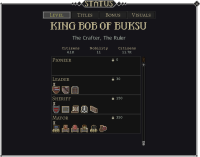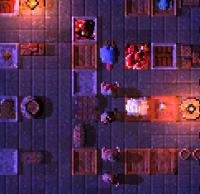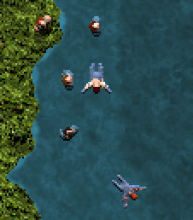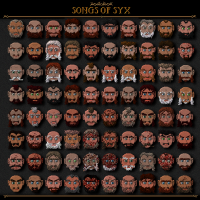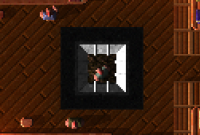Citizens: Difference between revisions
No edit summary |
Iamzeroone (talk | contribs) m (Jake confirmed the removal of the term "race" from the game. Changed instances of "race/races" to "species" and updated links.) |
||
| (14 intermediate revisions by 3 users not shown) | |||
| Line 1: | Line 1: | ||
{{imagefix|[[File:citizen_face.png|50px|left]]}}[[File:citizen_gui.png|thumb|200px|The Citizen GUI.]]'''Citizens''' are the very lifeblood and backbone of a [[settlement]]. For the majority of players, citizens are the largest class of [[subjects]]. Citizens can be of all eight [[species]]: the [[Amevias]], [[Argonosh]], [[Cantors]], [[Cretonians]], [[Dondorians]], [[Garthimis]], [[Humans]], and [[Tilapis]]. With the guide of the player, they are responsible for performing tasks and jobs to keep the settlement running and growing stronger, including the making of [[resources]]. All citizens have pre-generated names, personalities, faces, traits, wants, needs and preferred [[climate]]. These wants and needs must be met and managed by the player, to keep everyone [[Happiness|happy]] and working at maximum efficiency. Unhappy citizens may leave the settlement. Individual citizens can be marked as a favorite, making them easier to track for the player. [[File:PopulationGUI.png|thumb|256x256px|List of citizens in a settlement.]] | |||
Citizens are a type of subject and so they also have [[fulfillment]] and [[Subjects#Properties|properties]]. Additionally, the citizen population, as a group, has Loyalty and Happiness stats, which are unique to citizens. | |||
{{imagefix|[[File:citizen_face.png|50px|left]]}}[[File:citizen_gui.png|thumb|200px| | |||
Each | Each species is unique in what they excel at, and what they like and dislike. The player can click on a citizen to see their status and greater details about that individual. The player can check the amount of fulfillment and expectations of an individual, collectively as a species or all of the citizens in a settlement combined. Choosing a certain climate for the settlement will bring more [[Immigration|immigrants]] of a species that matches a climate they prefer. Certain species may also like or dislike other species, adding difficulty to a settlement made up of many species; most notably, all of them. | ||
There are four classes of citizen: normal citizens, retirees, recruits, students. Only normal citizens are part of the settlement's [[workforce]]. As the player's settlement expands and increases in quality, it will begin to see a rise in population through immigration. Note that population must be managed carefully, as if it's too low, there won't be enough people available to perform enough tasks and/or take employment, and if it's too high, the amount of [[food]] may not be enough to sustain everyone. Rising population will also increase standards and expectations of everyone. | |||
Enemy citizens can attack the player's settlement at certain times | Enemy citizens can attack the player's settlement at certain times. | ||
== | ==Loyalty & Happiness== | ||
The Loyalty stat is the overall measure of citizen loyalty to the settlement. If this stat is less than 100%, there is a chance there could be riots. The stat is impacted heavily by Happiness, but also influenced by [[School|Indoctrination]], education, soldiers present in the settlement, armies stationed elsewhere on the world map, and whether or not a species is the species the player began the game with. | |||
Happiness is [[fulfillment]] in proportion to expectations. Fulfillment is gained by providing services and ''fulfilling'' citizens' desires, such as access to lavatories, food, housing, various forms of entertainment, and more. Expectation increases with the population in your settlement. Happiness is also impacted by bonuses that may be gained via technology, serial killers on the loose, if a species is being prosecuted, and if free drink rations are being handed out. | |||
==Working== | |||
=== | ===Odd Jobbers=== | ||
{{imagefix|[[File:employment_counter.png|left]]}}'''Odd jobbers''' are a default, pseudo-employment option for citizens and [[slaves]]. Any citizen or slave without an occupation will be an odd jobber by default. They will wander around the [[settlement]] and be available for doing certain tasks given by the player, such as [[Fell Tree|cutting trees]], [[Clear Rock|collecting stone]] or [[Dig Into Mountain|cutting into mountains]]. If too many [[Workforce|employees]] are chosen for jobs, the counter can actually go into the negatives. | |||
It is advisable that players always have a decent amount of odd jobbers around the settlement, so they're always available to do much-needed tasks. If the amount of odd jobbers becomes too low, players can decrease the amount of employees working for certain [[building]]s, and/or simply allow more [[Immigration|immigrants]] to move in. | |||
If there's not enough employees or odd jobbers to do something, a building or task will warn the player of this in red text. | |||
==[[ | ===Occupations=== | ||
All citizens and slaves will wander around and do [[odd jobber|odd jobs]], unless they are given employment in a [[building]]. By default, employees will be automatically assigned to any open occupations. | |||
Regardless of what a person's job is, they will always take time off to fulfill their needs, such as sleeping, eating, maintaining their hygiene, drinking, using the bathroom, relaxing (if they can) and being near [[hearth]]s. | |||
Employed individuals will constantly maintain their job, always collecting and using resources, and/or making them if the job entails this. If there are no resources for someone to properly do their job, they will just stand around with nothing to do. | |||
==[[File: | ==Immigration== | ||
{{imagefix|[[File:immigration_anim.gif|left]]}}'''Immigration''' is the process of citizens moving into the [[settlement]]. When overall population happiness is above 80%, immigrants will begin taking interest in moving into the settlement. The [[climate]] the settlement is in will dictate the amount of immigrants from a certain [[species]] to show up more frequently that favor said climate. For example, starting the settlement in a colder climate will have more [[Dondorians]] immigrating than if the climate was warmer, simply because that's the climate that Dondorians prefer. | |||
Immigration can be controlled to the point where only a certain amount of people of a certain species can show up at once. Immigration should be managed carefully, because even though having the population grow leads to more things being done for the settlement, a population that's too high can empty [[food]] storage faster than it can be replenished, leading to a hungry population. Immigrants have lower expectations than non-immigrants. | |||
[[Cretonians]], [[Dondorians]], [[Humans]], [[Garthimis]], [[Amevias]] and [[Tilapis]] immigrate normally, but [[Argonosh]] and [[Cantors]] are not available for immigration. | |||
== | ===How it works...=== | ||
{{imagefix|[[File:immigration_counter_anim.gif|left]]}}When a species's happiness is above 80%, the chance to gain immigrants occurs. This is seen at the right of the screen, where the small icons of the three species are. An example image of the Cretonians is shown above. The first number shows how many people of a species are in the settlement, while the second number below the first shows the number of potential immigrants. To let the immigrants in, simply double-click on the species icon. Once this is done, the immigrants will arrive from the side of the world and move to the settlement. By going through the Population GUI, the maximum number of potential immigrants that can come in at once can be set, or it can be set to "auto", which automatically lets them in whenever available. | |||
== | ==Battle== | ||
When the settlement is developed enough, it will begin to face [[raid]]s. To prepare for this, a [[training ground]] must be built, and the magnitude of training for the citizens should also be properly managed. If citizens are tough enough, they should be able to fight off raids, or at least weaken them. When training, citizens convert to recruits. Equipment can be provided to increase their performance. | |||
* [[Weapons]] for better melee | |||
*[[Armor]] for greater defense | |||
* [[ | *[[Bows]] for greater ranged | ||
* [[ | |||
* [[ | |||
== | ==The Composition of Citizens== | ||
[[File:SubjectsDiagramv064.png|alt=Diagram of the composition of Subjects and Citizens.|thumb|200x200px|Diagram of the composition of Subjects and Citizens.]] | |||
'''All''' people in the settlement are subjects. Subjects are made of four classes: [[Nobles]], Citizens, [[Subjects|Children]], and Slaves. Children eventually grow into Citizens. Citizens are made up of four classes. Of those, three are non-working classes: Retirees, Recruits and Students. The final Citizens class is the working class. | |||
Clicking the first box in the overview panel at the top left of the screen will open the Subjects GUI. Adding all of these classes together will yield the total subjects in the settlement. | |||
The way Citizens are counted towards different totals is done differently in all three places that these numbers are displayed. | |||
'''Summary:''' | |||
*Subjects GUI - The word citizen indicates "Only Working Citizens". | |||
*Population GUI - The word citizen indicates "Only Working Citizens", but the quantity listed for population indicates "All Citizens", which are working citizens, retirees, recruits and students. | |||
*Status Level GUI - The word citizen indicates two different groups of people. Citizen on the left is "All Citizens". Citizen on the right is "All of the Citizens in all of the Settlements Controlled By the Player". | |||
{{clear}} | |||
=== | ===The Subjects GUI=== | ||
[[File:SubjectsGUI.png|thumb|The Subjects GUI|222x222px]] | |||
Open this GUI by selecting the first square in the overview panel at the top left of screen. In this GUI, the number of citizens displayed is only the citizens that are capable of performing occupations or odd jobs. Retirees, recruits and students have been deducted from the total number of citizens. This is especially obvious when comparing the listed quantity of citizens to the second square, which indicates total citizens, both working and non-working, on the above overview panel.{{clear}} | |||
== | ===The Population GUI=== | ||
[[File:PopulationGUI.png|thumb|The Population GUI|257x257px]] | |||
Open this GUI by right clicking on a species on the right of the screen. When selecting "All" from the list of species to the left, this GUI's citizen value will match the citizen value from the Subjects GUI. However, the Population value is the total amount of citizens in the settlement, ''including'' retirees, recruits and students. In other words, it equates to the total of all working and non-working citizens. Additionally, these numbers can be viewed on a per species basis by selecting a species on the left of the screen.{{clear}} | |||
===The Status Level GUI=== | |||
[[File:StatusLevelGUI.png|thumb|The Status GUI's Level Tab|200x200px]] | |||
This GUI can be opened by clicking the first icon in the row of icons at the top right of the screen. This GUI shows "Citizens" on the left, which is the total of both working and non-working citizens in the settlement and should match the second square of the overview panel at the top left of the screen. The term "Citizens" on the right, however, is the quantity of citizens across the entire Kingdom. If the player has other settlements, this number will be greater than the number on the left.{{clear}} | |||
==Gallery== | ==Gallery== | ||
| Line 192: | Line 84: | ||
[[Category:Gameplay elements]] | [[Category:Gameplay elements]] | ||
[[Category: | [[Category:Species]] | ||
[[Category: | [[Category:Articles with gallery]] | ||
<br> | <br> | ||
{{ | {{navbar_species}} | ||
Latest revision as of 19:04, 16 September 2023
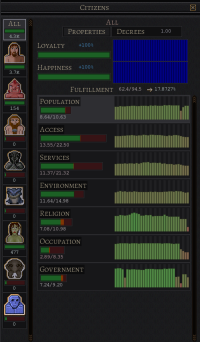
Citizens are the very lifeblood and backbone of a settlement. For the majority of players, citizens are the largest class of subjects. Citizens can be of all eight species: the Amevias, Argonosh, Cantors, Cretonians, Dondorians, Garthimis, Humans, and Tilapis. With the guide of the player, they are responsible for performing tasks and jobs to keep the settlement running and growing stronger, including the making of resources. All citizens have pre-generated names, personalities, faces, traits, wants, needs and preferred climate. These wants and needs must be met and managed by the player, to keep everyone happy and working at maximum efficiency. Unhappy citizens may leave the settlement. Individual citizens can be marked as a favorite, making them easier to track for the player.
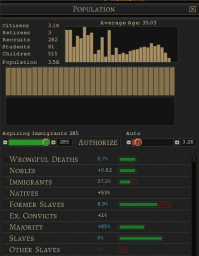
Citizens are a type of subject and so they also have fulfillment and properties. Additionally, the citizen population, as a group, has Loyalty and Happiness stats, which are unique to citizens.
Each species is unique in what they excel at, and what they like and dislike. The player can click on a citizen to see their status and greater details about that individual. The player can check the amount of fulfillment and expectations of an individual, collectively as a species or all of the citizens in a settlement combined. Choosing a certain climate for the settlement will bring more immigrants of a species that matches a climate they prefer. Certain species may also like or dislike other species, adding difficulty to a settlement made up of many species; most notably, all of them.
There are four classes of citizen: normal citizens, retirees, recruits, students. Only normal citizens are part of the settlement's workforce. As the player's settlement expands and increases in quality, it will begin to see a rise in population through immigration. Note that population must be managed carefully, as if it's too low, there won't be enough people available to perform enough tasks and/or take employment, and if it's too high, the amount of food may not be enough to sustain everyone. Rising population will also increase standards and expectations of everyone.
Enemy citizens can attack the player's settlement at certain times.
Loyalty & Happiness
The Loyalty stat is the overall measure of citizen loyalty to the settlement. If this stat is less than 100%, there is a chance there could be riots. The stat is impacted heavily by Happiness, but also influenced by Indoctrination, education, soldiers present in the settlement, armies stationed elsewhere on the world map, and whether or not a species is the species the player began the game with.
Happiness is fulfillment in proportion to expectations. Fulfillment is gained by providing services and fulfilling citizens' desires, such as access to lavatories, food, housing, various forms of entertainment, and more. Expectation increases with the population in your settlement. Happiness is also impacted by bonuses that may be gained via technology, serial killers on the loose, if a species is being prosecuted, and if free drink rations are being handed out.
Working
Odd Jobbers
Odd jobbers are a default, pseudo-employment option for citizens and slaves. Any citizen or slave without an occupation will be an odd jobber by default. They will wander around the settlement and be available for doing certain tasks given by the player, such as cutting trees, collecting stone or cutting into mountains. If too many employees are chosen for jobs, the counter can actually go into the negatives.
It is advisable that players always have a decent amount of odd jobbers around the settlement, so they're always available to do much-needed tasks. If the amount of odd jobbers becomes too low, players can decrease the amount of employees working for certain buildings, and/or simply allow more immigrants to move in.
If there's not enough employees or odd jobbers to do something, a building or task will warn the player of this in red text.
Occupations
All citizens and slaves will wander around and do odd jobs, unless they are given employment in a building. By default, employees will be automatically assigned to any open occupations.
Regardless of what a person's job is, they will always take time off to fulfill their needs, such as sleeping, eating, maintaining their hygiene, drinking, using the bathroom, relaxing (if they can) and being near hearths.
Employed individuals will constantly maintain their job, always collecting and using resources, and/or making them if the job entails this. If there are no resources for someone to properly do their job, they will just stand around with nothing to do.
Immigration
Immigration is the process of citizens moving into the settlement. When overall population happiness is above 80%, immigrants will begin taking interest in moving into the settlement. The climate the settlement is in will dictate the amount of immigrants from a certain species to show up more frequently that favor said climate. For example, starting the settlement in a colder climate will have more Dondorians immigrating than if the climate was warmer, simply because that's the climate that Dondorians prefer.
Immigration can be controlled to the point where only a certain amount of people of a certain species can show up at once. Immigration should be managed carefully, because even though having the population grow leads to more things being done for the settlement, a population that's too high can empty food storage faster than it can be replenished, leading to a hungry population. Immigrants have lower expectations than non-immigrants.
Cretonians, Dondorians, Humans, Garthimis, Amevias and Tilapis immigrate normally, but Argonosh and Cantors are not available for immigration.
How it works...
When a species's happiness is above 80%, the chance to gain immigrants occurs. This is seen at the right of the screen, where the small icons of the three species are. An example image of the Cretonians is shown above. The first number shows how many people of a species are in the settlement, while the second number below the first shows the number of potential immigrants. To let the immigrants in, simply double-click on the species icon. Once this is done, the immigrants will arrive from the side of the world and move to the settlement. By going through the Population GUI, the maximum number of potential immigrants that can come in at once can be set, or it can be set to "auto", which automatically lets them in whenever available.
Battle
When the settlement is developed enough, it will begin to face raids. To prepare for this, a training ground must be built, and the magnitude of training for the citizens should also be properly managed. If citizens are tough enough, they should be able to fight off raids, or at least weaken them. When training, citizens convert to recruits. Equipment can be provided to increase their performance.
The Composition of Citizens

All people in the settlement are subjects. Subjects are made of four classes: Nobles, Citizens, Children, and Slaves. Children eventually grow into Citizens. Citizens are made up of four classes. Of those, three are non-working classes: Retirees, Recruits and Students. The final Citizens class is the working class.
Clicking the first box in the overview panel at the top left of the screen will open the Subjects GUI. Adding all of these classes together will yield the total subjects in the settlement.
The way Citizens are counted towards different totals is done differently in all three places that these numbers are displayed.
Summary:
- Subjects GUI - The word citizen indicates "Only Working Citizens".
- Population GUI - The word citizen indicates "Only Working Citizens", but the quantity listed for population indicates "All Citizens", which are working citizens, retirees, recruits and students.
- Status Level GUI - The word citizen indicates two different groups of people. Citizen on the left is "All Citizens". Citizen on the right is "All of the Citizens in all of the Settlements Controlled By the Player".
The Subjects GUI
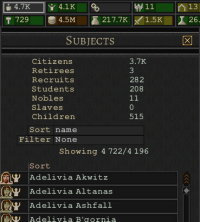
The Population GUI
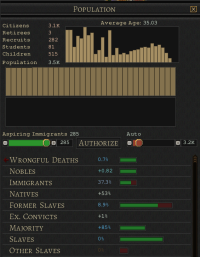
The Status Level GUI
